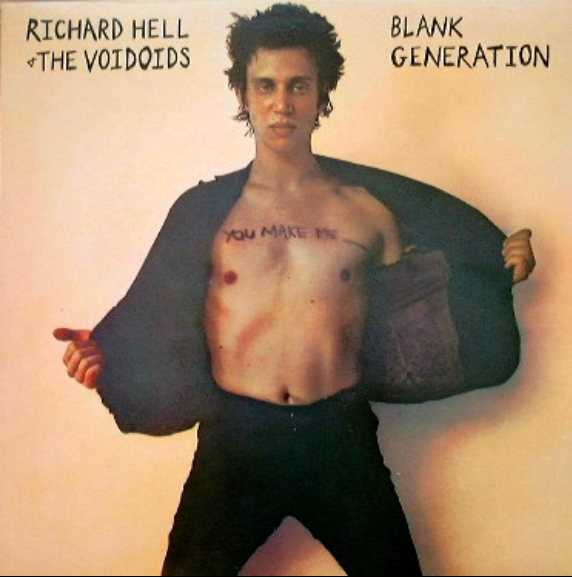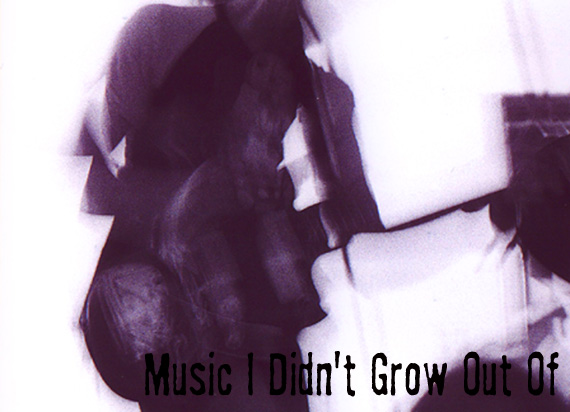-----
This is going to sound dorky, but the first time I heard “Love Comes in Spurts” by Richard Hell was when I was thirteen years old, because Christian Slater’s young pirate DJ plays it the in the starry-eyed 1990 teenage rebellion flick Pump Up The Volume, which I saw on its opening weekend, and which changed my life. Prior to that I’d never understood that there was such a thing as underground music, what it meant, who made it or played it or listened to it, or why. Having just turned thirteen and seeing before me the impending absurd agony of my six-year sentence to adolescence, it all became clear—the gleeful beauty of puerile, filthy, restless music that accepted that everything was fucked and there was not a damned thing any kid could do about it.

Punk rock existed to save kids like me, kids who could neither understand nor stand the role they were expected to play among their peers (theatrically contrast against the more ominous banality of adulthood). When, a year and a half later, I finally procured what I knew was an actual punk tape (In God We Trust, Inc. by the Dead Kennedys), I was at the end of my rope and had I not heard that music then, I can only darkly speculate what would have happened to me. Driven crazy by lingering shadows of the cold war, the protofascist social hierarchy of my upper middle-class high school, and that peculiar adolescent solipsism that convinces kids that their lives define all life and what they experience at the age of fourteen will be the feeling they will live in forever, I had to dig to find a way out. And dig I did. In that just-pre-internet age, the “underground” was actually hidden from view, and you needed some idea of where the cool places in town were if you wanted to have access to the people, the music, the ‘zines, the clothes, the community that seemed most assuredly to exist but into which one couldn’t simply buy.
If you were too nervous or young to walk up to kids with green hair and big boots, the only other option was local BBS network, a pre-internet system where local weirdos could commune pseudonymously and talk about their weirdo shit. There you could find out the names and locations of the crazy record stores that smelled of hash and incense and had records with frightening covers made by ominous people who were obviously insane. Those stores were run by terrifying old guys (almost always guys) with gravelly voices and faded denim wardrobes and just talking to them made you feel the paucity of your years. That was part of the trick: you needed to get over the fear of going in, of asking questions, of finding out what suited you, in order to know what it was you needed to find—more in yourself than in the store. That’s where I went, and that’s how I found out where to start, but there was no one to help me along. And, frankly, thank god for that.
Eventually, having borrowed some punk tapes from the tamer weirdos at my school, having been to the cool spots and screwed up my courage enough to meet up with other freaks from the local BBS, I ended up with some weird friends and a key to the underground community that was happening in my town. It was a scene where on some level you needed to be involved—you came to the shows, met the other weirdos, made friends, tried on identities for yourself in front of an audience of your peers, and ideally went on to help create and foster the community by starting your own bands, your own zines, or your own venue. Outside of the kids I meet on the BBSes, I met my first group of punks when I went alone to a show at an art gallery and lit the brick outer wall on fire with a can of lighter fluid as we stood in line waiting to get in. I was, at that point in my life, experimenting with pyromania, but everyone was testing themselves somehow. You tried out the possibilities for who you could be, but unlike at high school where you’d be beaten and ostracized for showing any sign of not being a wealthy, athletic, heterosexual specimen of the master race, you could try out being queer, being crazy, being criminal, being any of the things that your community had held you so tightly to keep you from becoming.
One day I remembered how much I’d loved that Richard Hell song and decided that I wanted to hear it again. Of course, I didn’t know it was by Richard Hell—all I knew was that it was called “Love Comes in Spurts” and that it had been in that Christian Slater movie. The latter information was useless, so all I could do was ask some the older punks if they knew the song. “Devo!” they said, sending me off to spend a couple of months digging through old Devo vinyl looking for the record with that song on it, to no avail. Because those records were, at the time, mostly unavailable on CD, the timeline for such a search was always a matter of weeks or months, predicated on waiting for someone to decide they didn’t want their old punk records anymore and sell them. Eventually I started asking questions of the haggard old guys that ran the record stores and a large bearded dude named Big Al said, “No, kid, not Devo! Who the fuck told you that? It’s Richard Hell and the Voidoids!”
“The metal band from Montreal?” I said.
“No, kid, not Voivod. Shit. The Void-OIDs. Record’s called Blank Generation.”
“Uh huh,” I said, promptly writing it down, “You got a copy of that?”
“Nah,” he said, “You don’t see it too often. It comes in from time to time. Gimme your number and I’ll call you if I see it.”
Scary as it was to give Big Al my number (He could call me! At home! Where I lived with my parents, who were civil servants!), I scribbled it down and handed it over. He wrote “BLANK GENERATION” in block letters over top of it and stuck in on a pile of stuff next to the phone. Then I began to wait, and to scour. I spent eight months searching for that record. Once a week I went to every one of the five or six cool record stores in town and checked their bins. Every time I visited relatives in another city, I asked my mom to drive me to the record stores, or I took the bus myself. When I returned home, I was back at the task. Once a week I asked Big Al, “is it in yet?” until he started greeting me at the door by growling, “We do not have a copy of Blank Generation. We have plenty of other records, though. Maybe you want to buy some?” At first he intimidated me, but over time I learned to make smartassed remarks back to him until I could provoke an impressed smirk. And I bought as many other records as I could afford as I waited for that Voidoids record to appear—Big Al himself gave me my first taste of Bad Brains, The Cramps, Hüsker Dü, Black Flag, the Germs, and more—discovering slowly the geography of a subterranean word held together by rock and roll.
To Big Al’s eye, I was, I think, the only fifteen year old obsessed with tracking down smacked out, nihilistic NYC art-punk recorded the same year he was born at a time when other kids the same age thought that Nirvana and Pearl Jam and Soundgarden were the pinnacle of rock and roll. But there were others like me looking for stuff that was just as off the wall, discovering, say, the Butthole Surfers, or Seven Year Bitch, or DRI, or Alice Donut, or whatever music weirdo kids heard and said, “This was meant for me.”
I found the Richard Hell record eventually, and it was great, but it could never have been as good as the eight months I spend looking for it, seeking, asking, learning how to participate among the older weirdos, getting up the courage to start shaving my hair off and dying it eye-gouging colours, learning the attitude required to talk back and not be pushed around for being myself. It was one of the most important periods in my life and it took place largely because there was a community there to support it, where old guys like Big Al knew that kids like me were going to come and need direction, and if you had the backbone to ask questions, you’d be rewarded with answers that proved more valuable with each passing day. That seems to me now a relic of another time.
If I was fifteen years old right now and I wanted to find a song like that, I’d download it in fifteen minutes on my parents’ computer, and I’d read the history of the band online and, maybe, if I was lucky, find a message board where folks were talking about old songs. It’d be amusing for a few minutes, and then I’d move on to something else. I wouldn’t meet any weird kids and borrow tapes from them, nor go by myself to a “punk” show not really knowing what that entailed, nor would I have to screw up my courage and talk to some crazy old dude in a Melvins t-shirt running a shadowy record store. I could do it all without leaving my house, and I’d get the song, for sure, but really, it wouldn’t end up mattering to me at all.



3 comments:
Someone should write a book called "This BBS Could Be Your Life."
So many BBSes were, weren't they?
Yeah I was really into them when I was a teen. My gateway to the zine scene.
Post a Comment